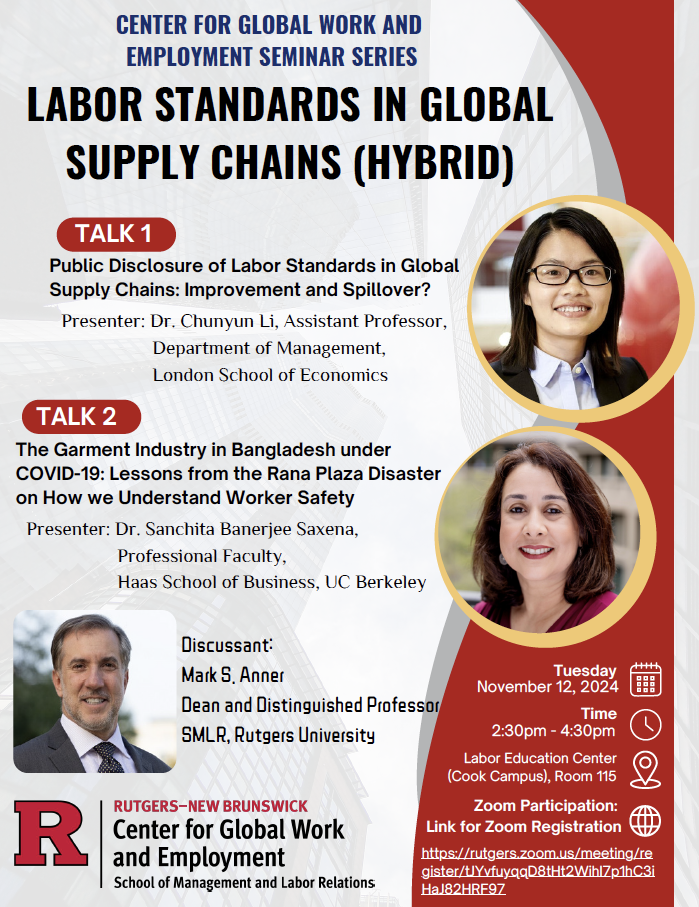
Tuesday, November 12, 2024
2:30pm - 4:30pm ET
Labor Education Center (Cook Campus), Room 115
Discussant: Mark S. Anner
Dean and Distinguished Professor, Rutgers School of Management and Labor Relations
Zoom Attendance: Click here to register for Zoom streaming.
For more information, contact Mingwei Liu (mingwei@smlr.rutgers.edu)

Talk 1 Abstract
Scholars and activists have argued that more transparency by global companies regarding labor issues in their supply chains is necessary for improving labor standards. However, relatively little is known about the mechanisms by which transparency programs translate into concrete improvements in labor practices. We develop a framework that delineates the different ways in which public disclosure can effect improvements, and test related propositions with longitudinal data from the ILO’s Better Work (BW) program which required public disclosure of selected labor standards through an online portal. Using a difference-in-difference analyses of 6,200 BW factory assessments across seven countries, we find that public disclosure does cause improvements in disclosed standards and there is a positive spillover effect to undisclosed labor issues as well. The effect of public disclosure on labor standards improvement is amplified by both external accountability mechanisms, such as the media coverage of the factory’s ESG incidents, but also how transparent its buyers are. Internal capability, notably the quality of management systems, also has an amplification effect.
About the Speaker
Dr. Chunyun Li is an assistant professor at the Department of Management of London School of Economics. She obtained her PhD in Industrial Relations and Human Resources from Rutgers University in 2016. Her research focuses on working conditions for workers in developing countries and she explores antecedents at both local level—worker mobilization and local/Chinese labor nongovernmental organization—and global level—global brands’ codes of conduct, purchasing practices, and transparency programs.
Talk 2 Abstract
The COVID-19 pandemic shook the global economy and supply chains worldwide. The ready-made garment (RMG) sector in Bangladesh was been especially hard hit as consumer demand for apparel plummeted, leading to global retailers cancelling orders and revising their sourcing strategies. To situate what happened to the industry under this global pandemic, I would like to draw some lessons from an earlier crisis in Bangladesh - from one of the worst industrial disasters in history, the collapse of the Rana Plaza building in 2013. In this presentation, I will focus specifically on the distorted notions of what constitutes safety for workers, primarily for women workers, which continue to perpetuate the cycle of labor violations for those at the very bottom of global supply chain. I argue that the lack of progress in many key areas created a situation that was ripe for suffering under an unanticipated and unprecedented global pandemic. My talk will draw on evidence from a survey with BRAC University, Bangladesh where we interviewed 1,057 garment workers to understand how the pandemic had impacted their lives (Rabbani, A, Saxena, SB & Islam, MF, 2020).
About the Speaker
Dr. Sanchita Banerjee Saxena holds a PhD in political science from the University of California, Los Angeles and has close to 20 years of experience working on issues related to labor rights in global supply chains, with a special focus on the garment industry in Asia. She is currently a Senior Advisor to Article One, a specialized strategy and management consultancy with expertise in human rights, responsible innovation, and sustainability. Dr. Saxena is a professional faculty member at the Haas School of Business, the Energy and Resources Group, and the Legal Studies department at UC Berkeley where she teaches classes about business, labor and global supply chains. She is also currently a Faculty Fellow at the Institute for Research on Labor and Employment (IRLE) at UC Berkeley. Dr. Saxena is the editor of Labor, Global Supply Chains, and the Garment Industry in South Asia: Bangladesh after Rana Plaza (Routledge, 2020), author of Made in Bangladesh, Cambodia, and Sri Lanka: The Labor Behind the Global Garments and Textiles Industries (Cambria Press, 2014), and author of a number of articles, reports, and research briefs. She has served as an advisor to a number of organizations including the Human Rights Measurement Initiative, Harvard Law School’s International Human Rights Clinic.


